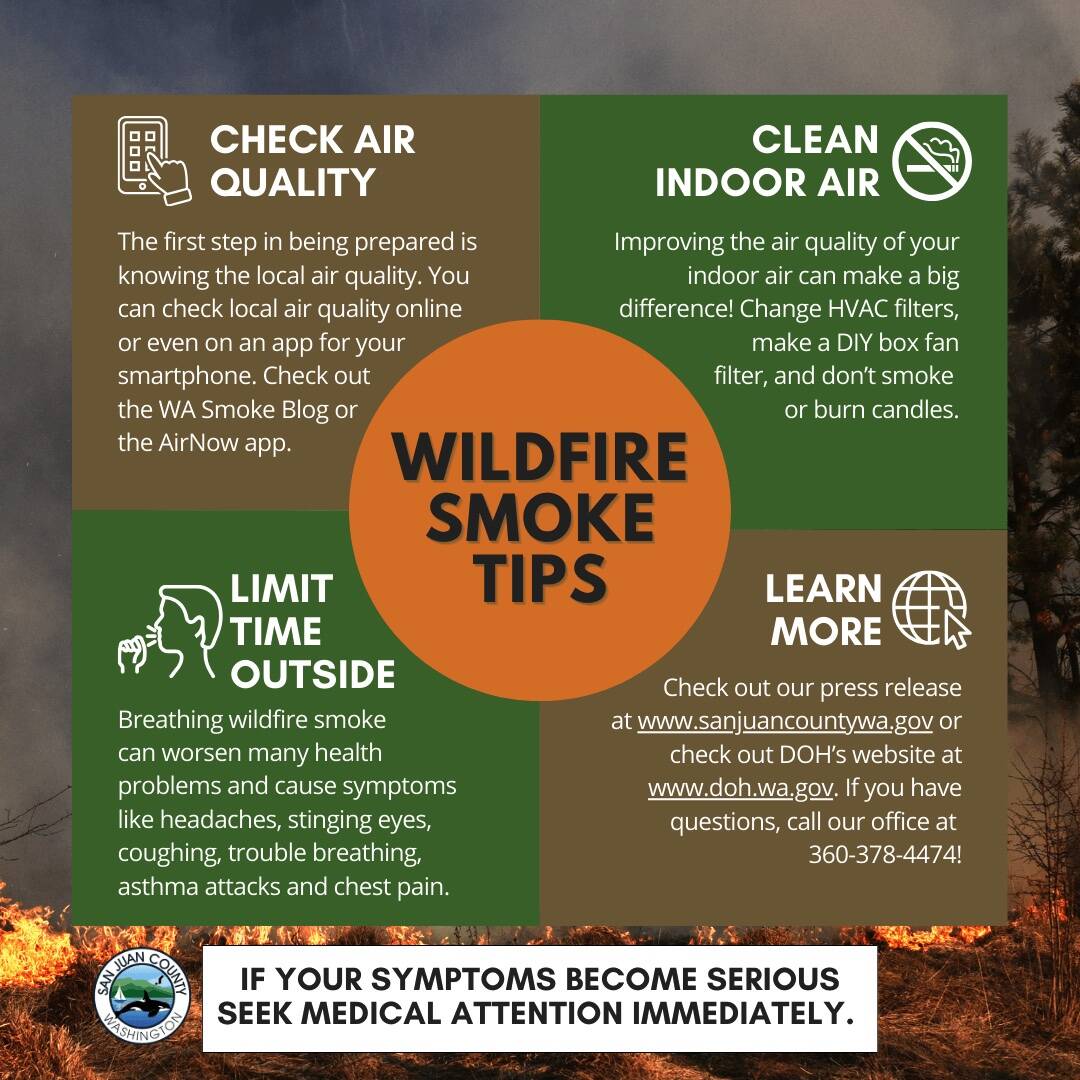Submitted by San Juan County Health and Community Services
Wildfire smoke made its way to the islands this week from Canada. It’s a good reminder to brush up on smoke safety tips. Here are a few tips to keep you and your loved ones safe in the event the islands experience unsafe smoke levels. It’s never too late to prepare!
Checking Air Quality
The first step in being prepared is knowing the local air quality. You can check local air quality online or even on an app for your smartphone. Here are our recommendations:
Online: WA Smoke Blog, https://wasmoke.blogspot.com/ This has current and forecasted wildfire and smoke locations.
Apps: Air Quality WA, https://enviwa.ecology.wa.gov/mobile/ EPA’s AirNow, https://www.airnow.gov/airnow-mobile-app/ and EPA’s Smoke Sense, https://www.epa.gov/air-research/smoke-sense-study-citizen-science-project-using-mobile-app.
Keeping Indoor Air Clean
Improving the air quality of your indoor air can make a big difference! Here are some ways to reduce smoke inside your home:
Change filters regularly in your HVAC system.
Use a HEPA portable air cleaner.
Limit activities that produce smoke indoors like burning candles or incense and smoking.
Close windows and doors unless it is too hot to maintain safe temperatures indoors. Learn more about how to have a “clean room,” go to https://www.epa.gov/indoor-air-quality-iaq/create-clean-room-protect-indoor-air-quality-during-wildfire.
Set air conditioner to circulate.
Seek cleaner air somewhere else if needed and if it’s possible to do so safely.
Build a DIY box fan filter if HEPA portable air cleaner’s are not available. For full instructions and supplies go to https://www.youtube.com/watch?v=4qr1Aj6Di7w .
Limit Time Outdoors
When air quality is bad, stay indoors! Breathing wildfire smoke can worsen many health problems and cause minor to serious symptoms like headaches, stinging eyes, coughing, trouble breathing, asthma attacks and chest pain.
If you must go outdoors, avoid strenuous activity and wear a properly fitted particle respirator, like a N95 mask.
Why It Matters
Smoke contains very small particles and gases. These particles can get into your eyes and lungs where they can cause health problems. Inhaling smoke is not good for anyone, however, people most likely to have health problems from breathing smoke include people with heart and lung diseases, people with respiratory infections, people with diabetes, stroke survivors, infants, children, pregnant people, and people over 65 years of age.
It is important to monitor symptoms of smoke exposure. Symptoms include burning eyes, coughing, throat and nose irritation, headaches, fatigue, wheezing and shortness of breath, irregular heartbeat, and chest pain. If your symptoms become serious seek medical attention immediately.
Relevant URLs:
Create a Clean Room | EPA, https://www.epa.gov/indoor-air-quality-iaq/create-clean-room-protect-indoor-air-quality-during-wildfire
Smoke From Fires | DOH, https://doh.wa.gov/community-and-environment/air-quality/smoke-fires
Children’s Health & Wildfires | PEHSU at https://www.pehsu.net/Children_s_Health_Wildfires.html
Washington Children and Youth Activities Guide for Air Quality | https://doh.wa.gov/sites/default/files/legacy/Documents/Pubs/334-332.pdf
Improving Ventilation and Indoor Air Quality during Wildfire Smoke Events | https://doh.wa.gov/sites/default/files/legacy/Documents/Pubs/333-208.pdf
Summary Wildfire Smoke Guidance for Closing Schools | DOH & DOEhttps://doh.wa.gov/sites/default/files/legacy/Documents/4300/334-431- WIldfireSmokeSCHOOLSummary.pdf
Coping with the Stress of Wildfire Smoke | EPA, CDC, et al https://www.airnow.gov/sites/default/files/2023-03/coping-with-the-stress-of-wildfire-smoke.pdf
Protect Your Pets from Wildfire Smoke | EPA https://www.airnow.gov/sites/default/files/2021-06/protect-your-pets-from-wildfire-smoke.pdf
Protect Your Large Animals and Livestock from Wildfire Smoke | EPA https://www.airnow.gov/sites/default/files/2021-06/protect-your-large-animals-and-livestock-from-wildfire-smoke.pdf
About San Juan County’s Department of Health & Community Services
San Juan County’s Department of Health & Community Services is responsible for community and environmental health, mental health and substance abuse programs, senior services, affordable housing projects, and more. The department has staff and offices on Lopez, Orcas, and San Juan Islands. For more information about San Juan County’s Department of Health & Community Services, visit www.sanjuancountywa.gov/1777/Health-Community-Services.



